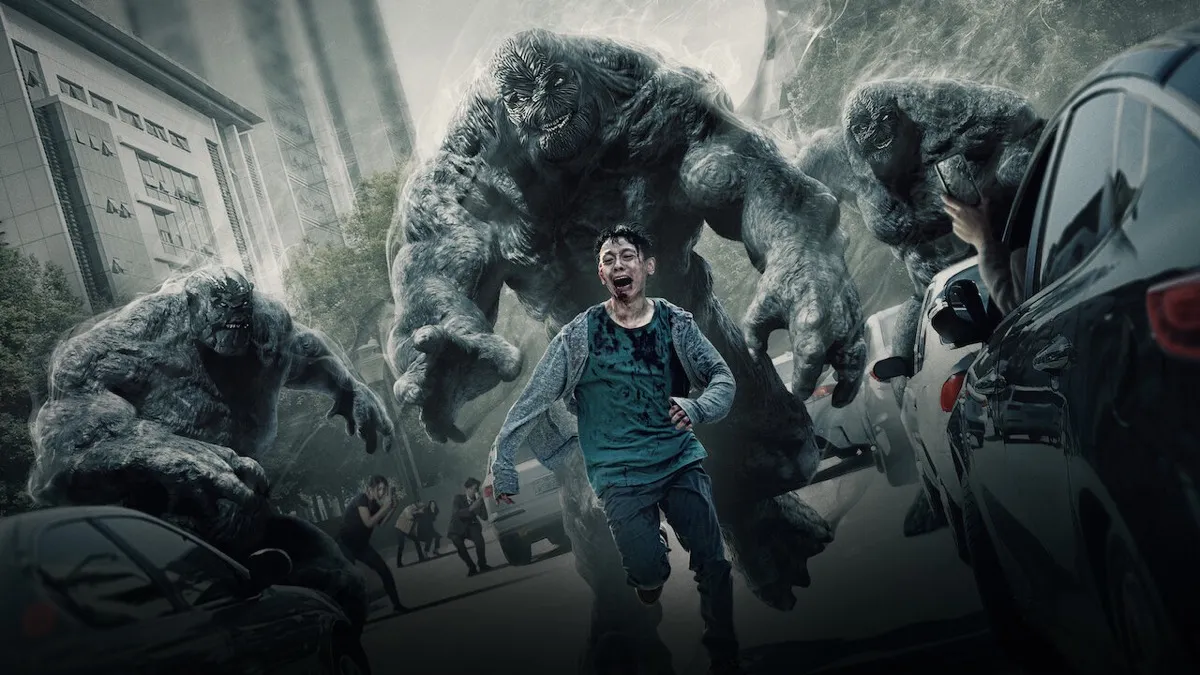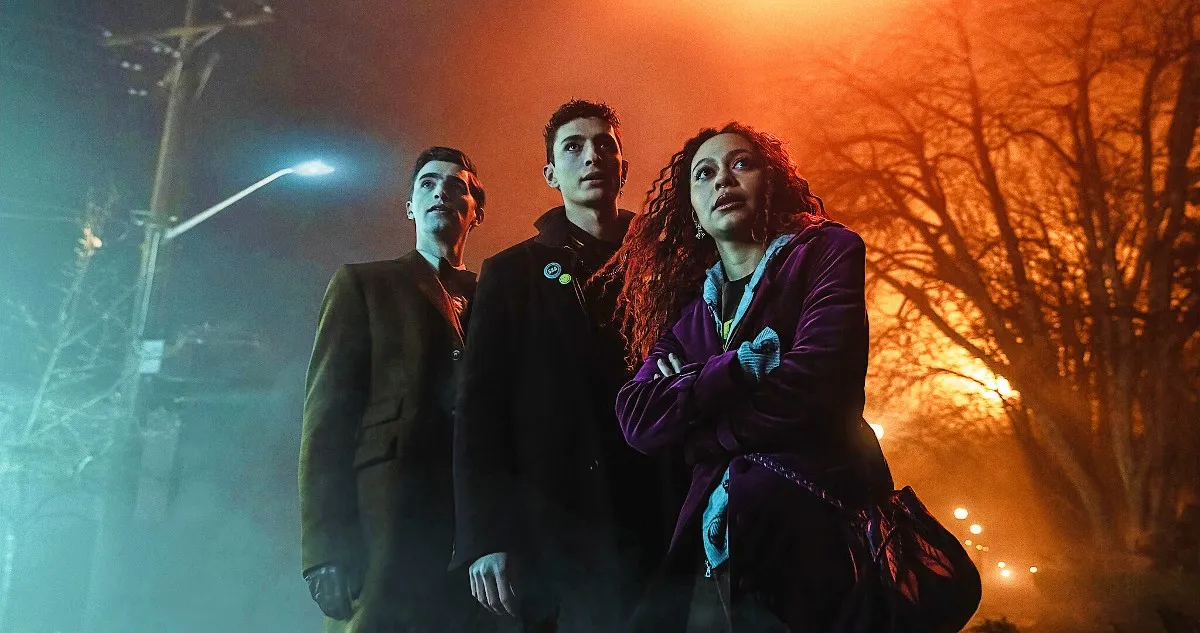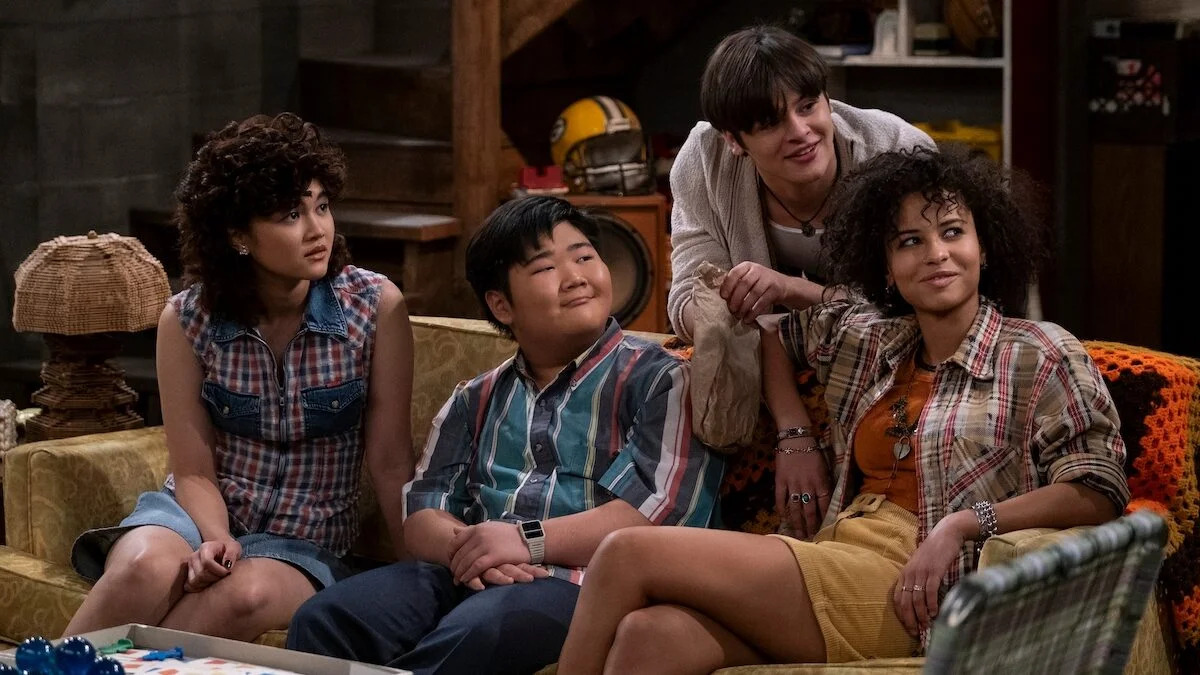I’ve seen two reactions to the idea of Jessica Jones fans framing its antagonist Kilgrave as a potential romantic interest: abject disgust, or shameful participation. Almost all of the reactions I’ve seen have been in the former category, though, and they’ve been vehement.
When I first saw the nascent Kilgrave fandom appearing on social media, I too felt a surge of disgust. But I soon noticed that even the participants in the fandom also tend to feel a sense of disgust at their own feelings. Most posts about Kilgrave tend to come with a lot of ashamed modifiers up top – such as, “I know he’s a reprehensible rapist,” and “I realize I’m a disgusting piece of trash for thinking of Kilgrave in this way,” and then continue to say something like, “But I can’t help but feel sorry for him and/or have a crush on him.” (This article about having a crush on Kilgrave puts “shameful” right in the title.) Kilgrave’s fandom hates itself, which makes sense, given that anyone who isn’t in the fandom hates them, too.
I’ve also seen – and I’d rather not link to any of this – a lot of uncomfortable speculation online about the types of people who are into Kilgrave. I’ve seen people speculate that anybody who has a crush on a character like this must be “fucked up” in some way, and that this fandom is evidence that young girls secretly harbor “rape fantasies.”
Even though I initially felt disgust about the idea of crushing on Kilgrave myself, I’ve been around the fandom block a few times – enough to know that villain-crushes are hardly a new phenomenon. However, the vehement response to Kilgrave fandom in particular feels somewhat new. I’ve seen fandoms get condemned for being “fucked up,” of course – we all have, right? Is Kilgrave any different than those other examples?
Let’s look back on some other “problematic fandoms.” Edward Cullen: stalker, abuser (emotional and physical), much-older predator of an underage high school girl. Christian Grey: rapist and domestic abuser – inspired by Edward Cullen, no less! Need more? I’ve got more. Khal Drogo! The Joker! The Riddler, especially his “Nice Guy” portrayal on Gotham! Hannibal! Cesare from The Borgias! I’m sure we can all think of reams of fictional murderers, abusers, predators, and/or rapists who’ve earned fandoms that reclaim them and adore them.
A lot of posts I see about abusive characters focus on redeeming them and rewriting them as sympathetic, misunderstood figures. This practice gets called “woobification” sometimes. In a post about this pattern, TumblrOfThrones writes: “Fandom often woobifies villainous characters who may or may not be good-looking young white males. They aren’t killing people and destroying worlds because they’re evil, they’re just misunderstood. Sometimes it’s good to feel pity for a villain, because it usually means the actor has created a character that isn’t one-dimensional. They have layers, and they aren’t boring and cliched. But understanding a character isn’t the same as forgiving the shit they pull.”
I would say what makes Kilgrave fandom a little different than the other fandoms that I’ve listed, though, is that even within the framing of his own show, Kilgrave is repeatedly referred to as a “rapist.” The actual repeated use of the word “rape” is, sadly, revolutionary. By contrast, a lot of the other characters that I listed – even if their actions are rape, violence, and abuse – do not get condemned or called out, within their own shows, for those crimes. Characters like, say, the Joker often get framed both within their own canon and in their attendent fandom as misunderstood and romanticized anti-heroes – relatable, even. Meanwhile, characters like Edward and Christian Grey aren’t even the villains of their own stories – they’re the love interests! You can’t get any more “romanticized” than that.
Kilgrave’s source material, however, does not go easy on him. There are only a couple of moments within Jessica Jones in which the audience is invited to feel sympathetic for Kilgrave, and they fall pretty flat (although, of course, his fandom has seized upon these moments regardless – I’ll get to that later).
Any well-written villain should have a back-story that explains his motivations, and Kilgrave certainly does have that. It’s fitting that he sees himself as the victim, despite his many crimes – this is a common way for abusers to behave in real life. Lundy Bancroft’s book Why Does He Do That goes into far more detail than I have space to do here as to how abusers’ thought processes work, and how they often see themselves as the victim of abuse, not the other way around. So too does Kilgrave see himself as a victim: he says his parents abused him, but according to them, they performed necessary medical tests on him in order to save him from a rare illness that he suffered. The experimental treatment that young Kilgrave underwent ended up giving him mind control powers – which in Episode 8 he claims that he doesn’t fully understand how to use, saying he can’t always tell when he’s using them or not. (I would argue that he absolutely DOES know when he’s controlling someone, and that his claims to the contrary are intentional gaslighting, and the entire rest of the show besides that scene makes this crystal clear.) Kilgrave also sees Jessica as his abuser and his torturer – even before she kidnaps him in the later episodes, she “tortures” him simply by refusing to be with him romantically. Her refusal, according to Kilgrave’s perspective, is cruel and unusual – it’s “abusive” that Jessica doesn’t want to be with him.
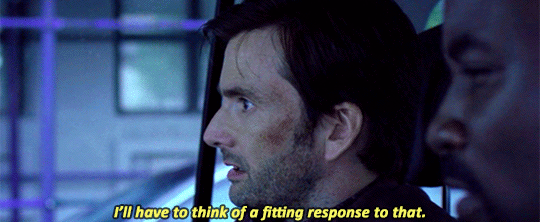 (image via Tumblr)
(image via Tumblr)
I could write a similar paragraph describing the awful behavior of any of the other “problematic favs” on the list I made above – but the difference would be that their own source material doesn’t condemn them for those actions. Throughout Jessica Jones, the audience is invited to sympathize with the survivors of Kilgrave’s abuse, not with Kilgrave. Other than a couple short moments in which Kilgrave explains that he believes himself to have been abused and wronged, the majority of the show focuses on his crimes against others – about which Kilgrave feels zero remorse. We learn about these survivors’ lives and perspectives; we see their support groups, their struggles. We don’t see exploitative or romanticized depictions of rape or abuse; the show seems to have made the intentional choice not to display those scenes, focusing instead on the aftermath felt by the survivors.
But since a Kilgrave fandom still exists – however small, however ashamed – then did Jessica Jones fail in its attempt to de-romanticize stories of abuse? Does the romanticization of Kilgrave, no matter how few people may participate in it, indicate that something is deeply wrong? Does it normalize the troubling idea that abusers can be reformed?
I would say yes. But I would also say that it’s important to look at all of the disparate pieces here. There’s a difference between, say, a fan who wants to rewrite a redemption arc for Kilgrave that contradicts everything we actually know about him as a character, versus someone who looks at Kilgrave as he’s depicted in the show and says “I can relate to that guy.” I don’t have much sympathy for the latter — but the former? Well, it’s complicated.
The idea of a redemption arcs for abusive characters – which, arguably, describes the entire plot of Twilight and its counterpart 50 Shades of Grey – makes sense to me as a fantasy, because it allows the writer (and, often, their self-insert protagonist in their story) a semblance of control. Here’s the formula: there will be a villain, seemingly irredeemable in his actions, until a pure, sweet heroine comes along who redeems him. “He’s evil, yes – but he learns how to be good, for me,” she justifies. And she’s right and they live happily ever after and nothing bad happens and he never goes back to being an irredeemable abuser again. Blue skies! Birds singing!
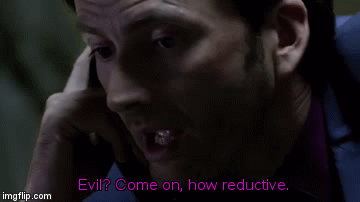 (image via Tumblr)
(image via Tumblr)
This is almost the plotline of Jessica Jones – but then the show takes the trope and throws it on its head. However, we’ve all seen this trope happen so many times that it’s understandable that the fandom might have a little whiplash about this new portrayal of the pattern. After all, the “romantic” version of this story would be Jessica realizing that she’s the only one who has the ability to withstand Kilgrave’s powers and offer him true consent – so she’s also the only one who can reform him, since she’s the only one who can refuse him. Her power of refusal makes her consent all the more “romantic,” right? And in that “romantic” version of the tale, she would be able to reform him in the end … even though in real life, abusers often cannot be reformed. And Kilgrave can’t, either, at least not according to his own source material.
I am not interested in vilifying people who believe in the narrative of the reformed abuser. So many people believe in this narrative that it would be a waste of time for us to condemn them all; it’s such a common narrative in our culture that I’d rather we instead focus on pointing it out, where it appears, and studying our own feelings and reactions to it. I think most of us can understand why it might be tempting to want to believe that someone can change, for love. We’ve all been in a situation where we wished someone would magically transform into a better person who treated us right – perhaps we’ve not experienced a situation as extreme as Jessica’s, but even with the superpower lens, there’s a lot to relate to in this story.
The fandom surrounding characters like Kilgrave – these supposed “rape fantasies” – are not actually fantasies about rape. Instead, they seem to be fantasies that offer the participant all of the power and control over the villain in question. Whether it’s a fan-fiction featuring Jessica or a self-insert character, the writer has ultimate authorial control over exactly what happens, moment by moment. That’s the way to get ultimate power over Kilgrave, right? To put him in your own story and make him do what you want him to do.
Have you ever talked to a BDSM participant about how a “scene” gets structured? The reason BDSM sexy-times get called “scenes” is because they’re staged – planned – scripted. A good dom will always tell you that in a “scene,” it’s the submissive who has all the control. The submissive delineates every single action that unfolds, decides how far it goes, when it starts, and when it stops.
Even people who don’t care for BDSM might still understand that the fantasy of structured, informed consent – as well as the theme of, “I am the only one who can have power over this evil person” – is what lies behind a lot of these fandoms. Even if the fantasy is about Kilgrave making you do something that you don’t “want” to do, you still ultimately do “want” to do it, because it takes place within the fantasy that you structured.
What’s more, some of these fantasies revolve around a desire to reclaim a past bad experience in which a person suffered a loss of control. Given that we all grow up soaked in gendered expectations about control in relationships – the stereotype that women are passive permission-givers, while men are aggressive sex machines that must be held at bay – it makes sense that fandoms would want to reclaim these narratives, or at least experiment within them.
The problem is actually much, much bigger than the tiny Kilgrave fandom, although some of the attitudes within that fandom seem to be symptoms of this larger systemic issue. And that issue is, these are the only types of relationships that we see. It’s not that individual women and young girls are “problematic” or “fucked up” because they want to believe in these “reformed abuser” narratives – it’s that these narratives are everywhere, so how can we possibly blame anyone for believing in them? Fandoms exist for real-life serial killers, sure – but also, real-life abusive relationships and gaslighting happen every day. The survivors of those experiences end up telling themselves, “Maybe I can be the one to get my abuser to snap out of it.” But in those real-life situations, their consent isn’t being respected.
As for me, I think the romanticization of characters like Edward and Christian is a hell of a lot more disturbing than that of characters like the Joker, Hannibal, and even Kilgrave. In many ways, Jessica Jones feels like an intentional response to the exact narrative tropes that have preceded it for so long. (Did you know that Jessica Jones showrunner Melissa Rosenberg adapted the Twilight books for the silver screen? One might even wonder whether the parallels were an intentional commentary, eh?) Although I may not fully understand the fandom surrounding Kilgrave, I do understand the general desire to reclaim a bad experience or experiment within a fictional or virtual space. Something that you can turn off, a tab you can close, a pen you can put down.
 (image via Tumblr)
(image via Tumblr)
Even the tendency to try to understand Kilgrave’s motives and the attempts to ascribe some goodwill to his actions makes sense to me, although the results will end in futility. We all want to believe that no one could be as reprehensible and remorseless as Kilgrave – and creating a fiction in which Kilgrave realizes he’s done wrong might seem tempting. Even creating a fiction in which you, the writer, have “control” over Kilgrave’s actions at last – no matter how reprehensible they may be within that fiction – can be a form of reclamation and validation, of sorts.
I hope I can encourage other people not to condemn these fandoms or this behavior of fans, because I truly don’t believe that we should. Instead, I think we should speak more openly about abuse and gaslighting, as well as the behavior patterns of abusers – and we should discuss our own experiences and attempt to find spaces to sort through our feelings safely. Sometimes, our own brains can be “problematic.” But rather than condemning those feelings, or saying “you aren’t allowed to feel that way,” or saying, “no one is allowed to romanticize [such-and-such character],” I’d rather we shine a light on our own feelings and search ourselves for answers.
(Featured image via Tumblr)
—Please make note of The Mary Sue’s general comment policy.—
Do you follow The Mary Sue on Twitter, Facebook, Tumblr, Pinterest, & Google +?





